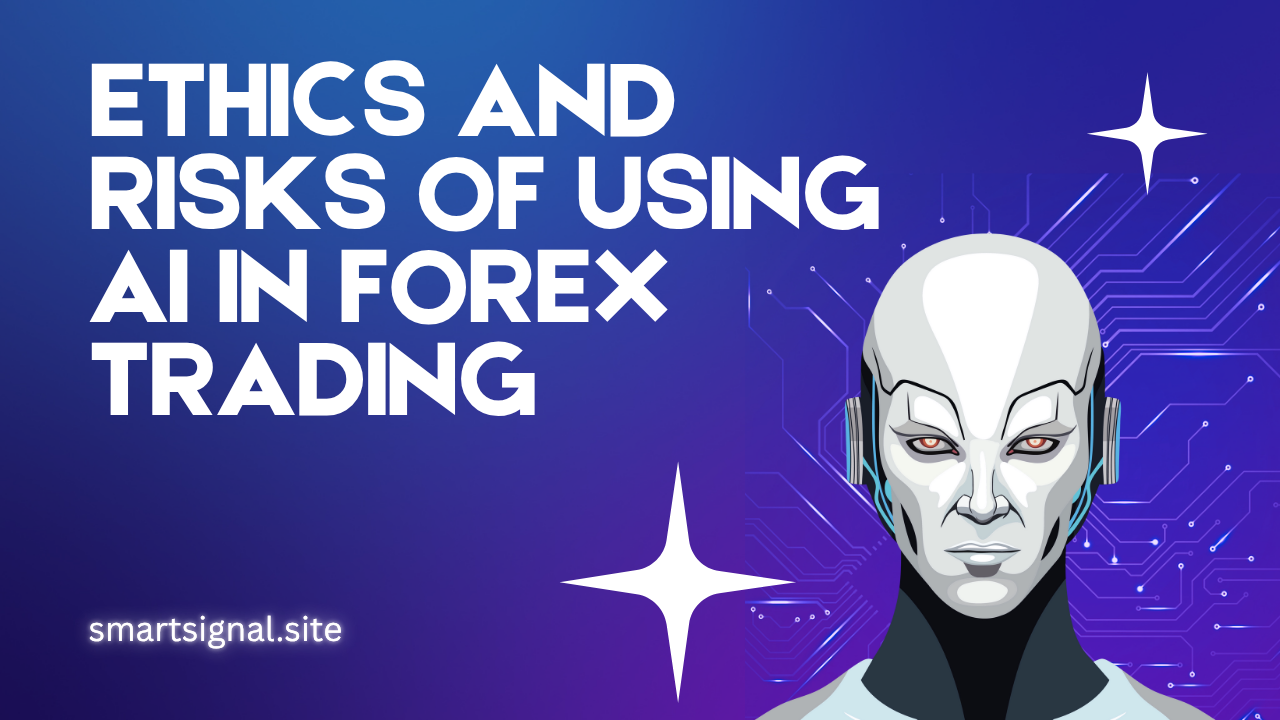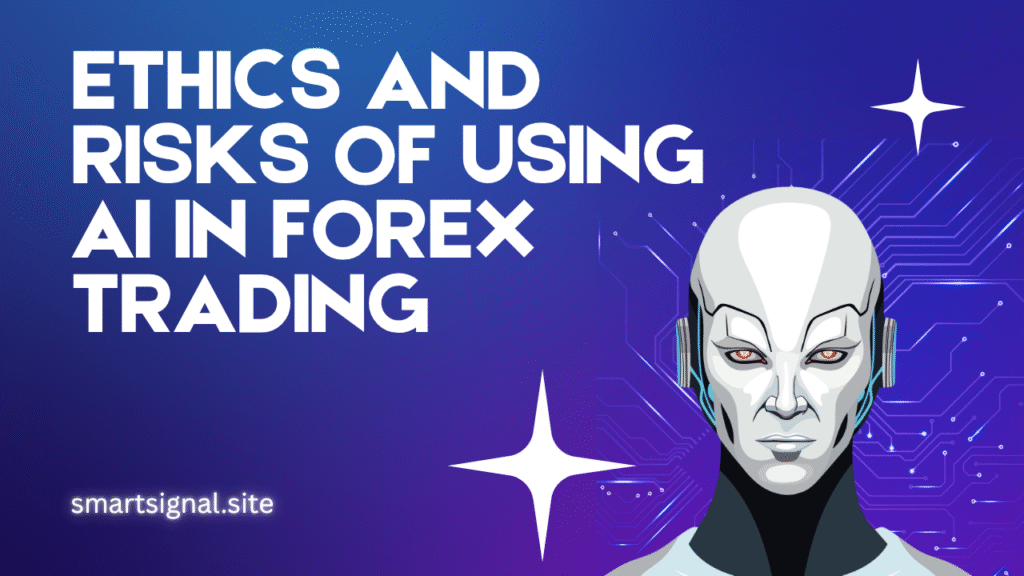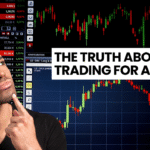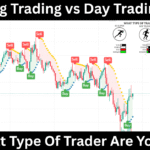What is AI in Forex Trading?
At its core, AI in forex trading involves machine learning models, neural networks, and advanced algorithms analyzing massive datasets to predict currency trends, execute trades, and optimize portfolios. These AI tools use historic and real-time market data, sentiment analysis, and pattern recognition to make trading faster and more accurate.
From improving risk management to enabling algorithmic trading, AI-powered solutions such as TradeZenith and SigmaForex AI are now staples in the forex landscape. However, with great power comes great responsibility.

1. The Ethical Dilemmas of AI in Forex Trading
Deploying AI in forex trading generates significant ethical concerns, particularly related to fairness, transparency, and potential misuse:
A. Transparency and Accountability
AI systems often operate as “black boxes,” meaning the decision-making processes are difficult to interpret. This lack of transparency raises issues of accountability. Who should take responsibility if an AI incorrectly forecasts market conditions, resulting in massive losses?
B. Algorithmic Bias
AI models are only as good as the data fed into them. If the training data is biased, the AI can replicate and amplify these biases, resulting in unfair or misleading predictions. This can systematically disadvantage certain traders or skew market dynamics.
C. Equal Opportunity and Market Distortion
While AI affords significant advantages to traders with access to advanced tools, it risks creating a divide in the trading landscape. Retail traders who lack the resources for high-end AI systems may find themselves at a competitive disadvantage, raising concerns about fairness in the financial markets.
2. Risk #1: Overreliance on AI Models
Many traders make the mistake of viewing AI as infallible. However, no algorithm can predict market movements with 100% certainty.
- Black Swan Events: Events like pandemics or economic collapses disrupt patterns and data that AI relies on. Historical models cannot account for unprecedented market shocks, increasing the risk of incorrect predictions.
- Loss of Intuition: Overdependence on AI may lead traders to abandon their market instincts, causing them to miss anomalies or opportunities that AI tools fail to catch.
How to Mitigate This Risk
Combine AI predictions with human judgment. Use AI as a decision-support tool rather than a replacement for critical thinking.
3. Risk #2: Ethical Data Use and Privacy Concerns
AI systems for forex trading often depend on vast amounts of financial, geopolitical, and even personal data to generate accurate insights. Improper data handling practices could spark serious ethical issues and legal troubles.
- Data Privacy: Regulatory frameworks like GDPR in Europe mandate strict rules about data usage, and violations can carry steep penalties.
- Ethical Challenges: Collecting massive datasets often involves questionable practices, such as scraping data from unsecured platforms.
How to Mitigate This Risk
Work with AI providers and platforms that adhere to strict data protection policies. Ensure all data-based activities comply with local and international regulations.
4. Risk #3: Market Manipulation
AI-driven tools have the power to manipulate markets, either directly or indirectly. For example:
- Algorithms capable of high-frequency trading (HFT) execute thousands of trades in milliseconds, amplifying market volatility.
- Traders may exploit AI to mislead markets by generating false signals or manipulating sentiment analysis.
How to Mitigate This Risk
Advocate for regulatory oversight of AI in trading to monitor and curb manipulative practices. Platforms implementing AI should be transparent about their algorithms’ intentions and operations.
5. Risk #4: The Cost Barrier
Implementing AI into your forex trading strategy comes at a price. Whether it’s the initial setup or ongoing licensing fees, not everyone can afford the cutting-edge precision that AI tools offer.
- Cost of Entry: Advanced AI platforms like PioneerAlgo can cost thousands, making them inaccessible to individual or small-scale forex traders.
- Scaling Challenges: For small organizations, integrating and maintaining AI can outweigh immediate gains.
How to Mitigate This Risk
Start with tools that offer free trials to evaluate their value. Platforms offering flexible pricing structures can make AI adoption more feasible.
6. The Need for Regulations in AI-Driven Forex Trading
The legal framework regulating AI-based trading is still evolving, and it heavily influences ethical AI development and deployment. Without clear guidelines, traders and financial institutions risk straying into unethical or illegal activities.
Key Regulatory Concerns:
- Licensure for AI Tools: Is the algorithm licensed fairly?
- Trading Compliance: Does the AI align with forex-specific legal standards?
- Global Variance: Regulations in one part of the world may differ in another, creating compliance challenges for international traders.
How to Mitigate This Risk
Stay informed about emerging guidelines from entities such as the Securities and Exchange Commission (SEC) or Financial Conduct Authority (FCA). Ensure your AI tools comply with local and international laws.
7. Steps for Responsible AI Implementation in Forex Trading
To ensure the ethical and effective use of AI in forex trading, consider the following best practices:
- Select Transparent Tools: Choose platforms that provide clear explanations of how their models generate predictions.
- Set Ethical Standards: Define your strategy’s ethical limits. For instance, discourage using AI systems for manipulative purposes like spreading false market signals.
- Regular Auditing: Periodically review algorithmic performance to identify and correct biases or errors.
- Combine Strategies: Leverage AI to enhance a balanced mix of technical analysis, fundamental analysis, and intuition.
- Education: Train your team to understand AI’s potential and limitations.
Relevant Post
Can You Make a Living from Trading? Here’s the Honest Truth
Fraquently Asked Questions (FAQs)
Is AI in forex trading ethical?
AI itself is neutral; its ethicality depends on how traders deploy it. Responsible usage, compliance with regulations, and fostering transparency can ensure ethical AI applications.
Can individual traders use AI in forex?
Yes, many AI tools cater to retail traders. Some platforms even offer free trials, making them accessible to beginners.
Does AI guarantee profits in forex trading?
No, while AI enhances predictive accuracy, markets remain inherently unpredictable, and informed judgment is always essential.
What is the biggest drawback of using AI in forex?
Overreliance on AI and algorithmic errors during unprecedented events are significant risks.
What’s the cost of using AI tools in forex trading?
Pricing varies based on tool sophistication. Small-scale traders can begin with free or basic versions before investing in premium features.
The Future of AI in Forex Trading
AI is transforming forex trading by making it faster, smarter, and more data-driven. However, unlocking its full potential requires a commitment to ethical practices and risk mitigation. Whether you’re an individual trader or an organization, deploying AI responsibly will define your long-term success in the evolving forex landscape.
Are you ready to responsibly integrate AI into your forex trading strategy? Start exploring AI-powered trading tools today to stay ahead in t



Pingback: Swing trading vs day trading for beginners